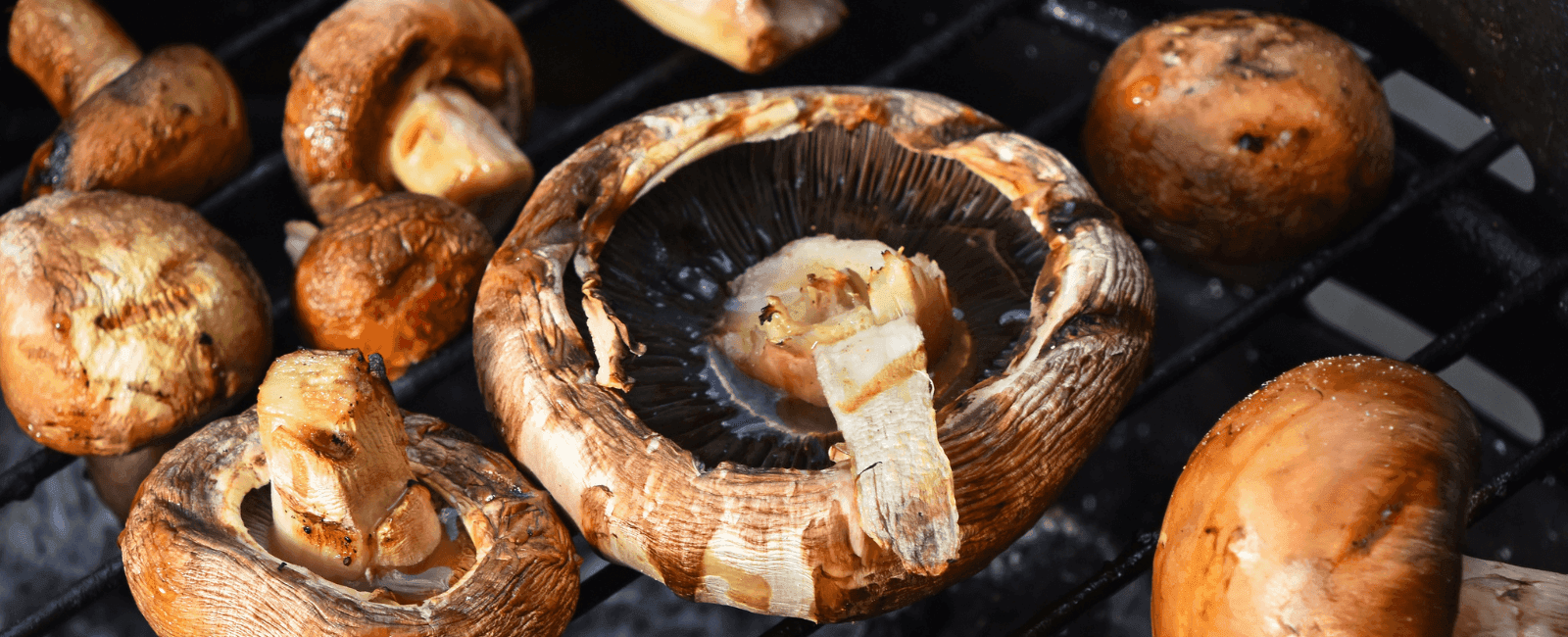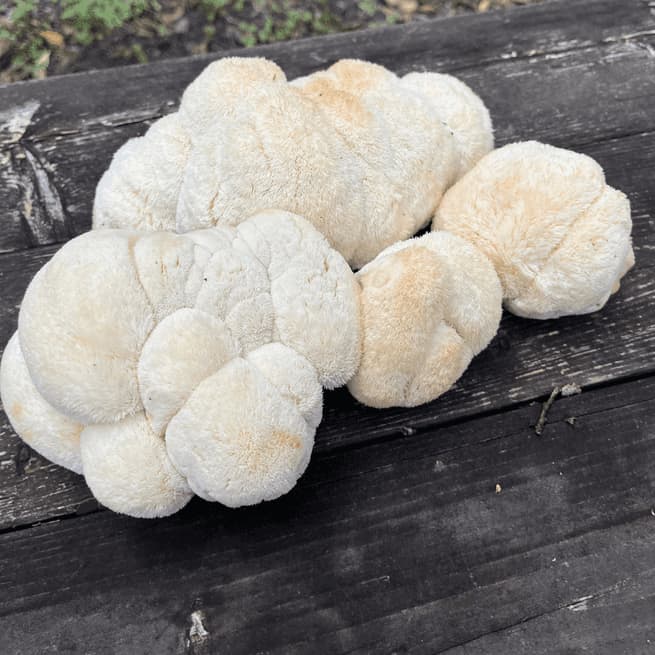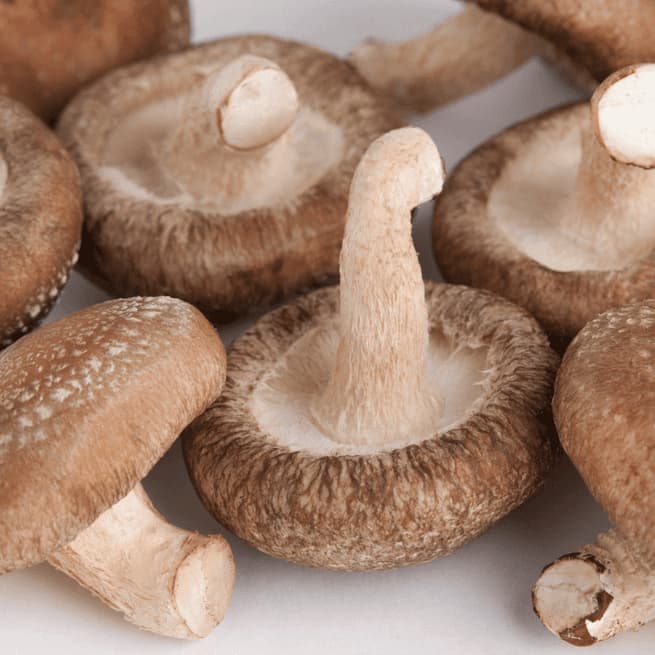

Mushrooms are a great meat alternative due to their meaty texture and umami flavor. Whether you’re opting for a plant-based diet or aiming for a more sustainable food option, there’s a mushroom meat replacement for every recipe.
Even though mushrooms could never entirely replace meat (and vice versa), high-quality mushrooms are still a nutritionally dense food that can share a similar flavor and texture profile compared to meat products.
Nutrition comparison: mushrooms vs. meat

Let’s be real — mushrooms do not have nearly as much protein as meat, nor should they be relied upon as your sole source of plant-based protein. According to the USDA, most mushrooms average around 2-3 grams of protein per 100 grams, whereas ground beef has 14 grams and chicken breast has 31 grams.
Nonetheless, mushrooms have great nutritional value that’s comparable to animal protein macronutrients outside of protein. For starters, mushrooms contain significantly less cholesterol, calories, and saturated fat than meat products. They’re also low in carbohydrates, making them a perfect addition to a keto diet that already cuts out carbs.
The health benefits of mushrooms are striking. Mushrooms are full of vitamins and minerals, including vitamin D, antioxidants, folate, selenium, and vitamin C. Plus, mushrooms are a good source of B vitamins like vitamins B1 (thiamine), B2 (riboflavin), vitamin B3 (niacin), vitamin B5 (pantothenic acid), and vitamin B12 (cobalamin).
Despite their relatively low protein content, mushroom protein contains all nine essential amino acids. Though you would need to eat significantly more mushrooms to obtain your full daily value of protein and amino acids, mushrooms are high in fiber, so they are very filling while being low in calories.
In a 2017 study posted in the Appetite academic journal, mushrooms were found to be more filling than meat, as participants reported less hunger and more satisfaction after a daily breakfast, including mushrooms as the main source of protein compared to meat (1). When combined with other plant-based proteins like lentils, nuts, and soy, mushrooms can leave you feeling satiated and fill in those protein gaps while adding extra nutrients and fiber to your meatless meals.
The best mushroom meat substitutes
With so many mushrooms out there, you may want to know what the best mushrooms are to replace meat in your dishes. We’ve compiled a list of the top mushrooms with the highest source of protein and a delightful flavor and texture for when you opt to use mushrooms instead of meat:
Oyster mushrooms

Oyster mushrooms are one of the world’s most common edible mushroom species, with hundreds of different species. Some of the more typical oysters you may find in the store include king, pearl, blue, and pink oysters. They’ve been used to replace scallops, pulled pork, fried chicken, and so much more since they have a remarkably meaty texture with a sweet and somewhat fishy flavor. With around 3.4 grams of protein per 100 grams, oyster mushrooms are some of the best mushroom meat substitutes out there.
Chicken of the woods

Although you’re unlikely to find chicken of the woods in your local grocery store, this wild mushroom is absolutely jam-packed with protein. In fact, chicken of the woods not only tastes just like chicken but also has nearly the same protein content as its poultry counterpart. With a whopping 21 grams of protein per 100-gram serving, this mushroom has arguably the highest amount of protein in the fungi world. Fortunately, chicken of the woods is relatively easy to spot and identify due to its distinctively bright color and no direct look-alikes.
While this mushroom is safe to eat when cooked, you should avoid harvesting it from conifers like the Yew tree, as it can absorb toxic alkaloids that are harmful to human health. Additionally, just like any wild mushroom, chicken of the woods can cause an allergic reaction in some individuals. Therefore, it’s best to consume the mushroom with caution and in small amounts when first trying it out to make sure that you don’t wind up with an upset stomach.
Portobello mushrooms

Portobello mushrooms and big, meaty, and juicy, making them a perfect meat replacement for many of your favorite dishes. Grill up a whole portobello and use it as a patty the next time you have a burger, or slice it thin and dry it into jerky. Try filling them with cheese or minced tofu for a delicious stuffed mushroom meal. Portobellos have around three grams of protein per 100-gram serving, but they’re very filling and have a great firm texture that’s perfect for sinking your teeth into.
White button mushrooms

White button mushrooms are so common and affordable while also super versatile, so they’re great to use as a meat replacement. These mushrooms also have around three grams of protein per serving, and they make a hearty replacement for any recipe you may use for chicken. Dice white button mushrooms up and sautee them with seasonings for a great ground meat replacement, or roast them on skewers for a delicious mushroom kebab. No matter what, these rather basic mushrooms can make a brilliant centerpiece for a meat-free dinner.
Morel mushrooms

Morels are yet another wild mushroom that you’re unlikely to find fresh in your local produce market. Nonetheless, if you can get your hands on these coveted mushrooms, you’re in for a treat that’s unlike many mushrooms you could buy at the store.
They have an intense nutty and umami flavor that’s enhanced by their meaty texture. Morels don’t get slimy when cooked, so their texture is a satisfying replacement for chicken or beef in any pasta, soup, or stir fry. Coming in at around two grams of protein per serving, morels are still a great option when you want to munch on a meatier mushroom.
Lion’s Mane mushrooms

If you’ve never had a lion’s mane “crab cake” before, you’re definitely missing out on a delicious crab substitute chock-full of several health benefits. It may be a bit tricky finding fresh lion’s mane in your local grocery stores, but you may get lucky finding at least some dried lion’s mane at a specialty shop.
This functional mushroom has a mildly sweet, fishy flavor that makes it great to replace seafood. Lion’s mane not only tastes delicious but is known to be a natural nootropic. Studies have found that lion’s mane can support memory and cognitive function while lowering stress levels. With 2.4 grams of protein per 100-gram serving, lion’s mane is an excellent substitute for your crab or lobster recipes, with an additional health boost.
Shiitake mushrooms

Shiitakes have 2.2 grams of protein per serving – not much compared to meat, but their unique flavor and durable texture make them a fantastic option for your meat-free meals. Their taste is very savory and almost meat-like, as many online recipes use them instead of pork or duck.
Shiitake bacon and jerky are prevalent methods of using the mushroom as a meat replacement, as when they are dried up, they have a fulfilling chewy texture. However, you can also use shiitakes in soups and stir-fries. Shiitakes also hold medicinal value, as they are high in polysaccharides, making them great for the immune system and protecting against cell damage.
The overall verdict
Since mushrooms are so versatile and there are so many to choose from, they offer a diverse food option to those looking to cut their meat consumption. Although mushrooms could never completely replace the protein content of meat, they can have a similar taste and texture with significantly fewer calories and fat. If you’re looking for a healthier, plant-based meat alternative, mushrooms are your best friend. Just serve them with other forms of plant protein for a complete, nutritionally dense, well-balanced meal that’ll keep you feeling full and satisfied.
If you’re looking for a healthier, plant-based meat alternative, mushrooms are your best friend. Just serve them with other forms of plant protein for a complete, nutritionally dense, well-balanced meal that’ll keep you feeling full and satisfied.
Whether you’re familiar with medicinal mushrooms or the psychedelic types of mushrooms, it’s becoming clearer that they’re a reliable, good source of protein for the planet. The nutritional benefits of mushrooms, across all of the varieties of mushrooms, are truly bar none. Whether you choose chanterelles, cremini, or enoki mushrooms, these fresh mushrooms amplify every dish with a dose of dietary fiber and potassium.
References
- Yuwa-Amornpitak, Thalisa, Luchai Butkhup, and Pa-Nag Yeunyaw. 2020. “Amino Acids and Antioxidant Activities of Extracts from Wild Edible Mushrooms from a Community Forest in the Nasrinual District, Maha Sarakham, Thailand.” Food Science and Technology 40 (3): 712–20. https://doi.org/10.1590/fst.18519.


